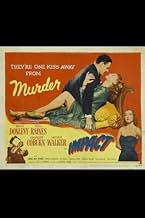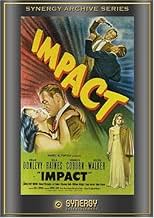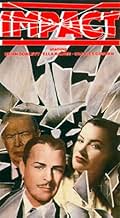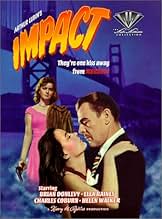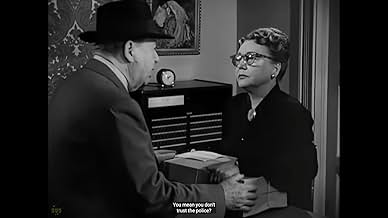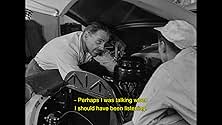IMDb RATING
7.0/10
5.2K
YOUR RATING
A unfaithful wife plots with her lover to kill her husband, but the lover is accidentally killed instead. The husband stays in hiding and lets his wife be charged with conspiracy.A unfaithful wife plots with her lover to kill her husband, but the lover is accidentally killed instead. The husband stays in hiding and lets his wife be charged with conspiracy.A unfaithful wife plots with her lover to kill her husband, but the lover is accidentally killed instead. The husband stays in hiding and lets his wife be charged with conspiracy.
Glen Vernon
- Ed
- (as Glenn Vernon)
Linda Leighton
- Telephone Operator
- (as Linda Johnson)
Jason Robards Sr.
- Judge
- (as Jason Robards)
Featured reviews
Whoever likes movies of the late Forties should not miss this one. It tells a typical film noir story that is coherent and easy to understand. Impact is a quite artful picture, obviously made by first rate professionals. The balance between location shooting (mainly in and around San Francisco) and the extraordinarily stylish sets is in my opinion perfect and well thought out. At the center of the story is the attempted killing of the main character by his wife's lover. The car with the two men drives at night along a sinuous mountain road. It slows down and stops because of a flat tyre. As the viewers already know, this is the spot where the murder should take place. With unbelievable ease the natural surroundings (reminding you of the dramatic climax in Hitchcock's Family Plot) change into an almost expressionistic stage set with artificial fog at the bottom and everything. It is an unforgettable moment. What the film people could achieve in those days!
Brian Donlevy has some very good moments. As after a phone call he fully realises that his wife who he naively loved (calling himself "Softy" in his messages to her) had cheated and betrayed him, he stumbles to a bench on a station platform, stares into the void with dim eyes and then starts crying with rage and frustration. The scene takes almost a minute and proves that Donlevy is a much underrated actor who should be honored more.
Apart from the realistic presentation of parts of San Francisco in the late Forties (it complements Welles impressions in Lady from Shanghai"), Impact has some nice pieces of slang (at least to a foreigner whose mother tongue is not English). "Grovel a shuteye" for "taking a nap", that's nice, isn't it?
Brian Donlevy has some very good moments. As after a phone call he fully realises that his wife who he naively loved (calling himself "Softy" in his messages to her) had cheated and betrayed him, he stumbles to a bench on a station platform, stares into the void with dim eyes and then starts crying with rage and frustration. The scene takes almost a minute and proves that Donlevy is a much underrated actor who should be honored more.
Apart from the realistic presentation of parts of San Francisco in the late Forties (it complements Welles impressions in Lady from Shanghai"), Impact has some nice pieces of slang (at least to a foreigner whose mother tongue is not English). "Grovel a shuteye" for "taking a nap", that's nice, isn't it?
Although the final third gets in the way and is finally disappointing,it does not keep "impact" from being absorbing and entertaining.One of the rare film noirs -maybe the only one - which takes a look on the brighter side of the road:sandwiched between two very dark parts,the second one has Capra accents:the country town is some Shangri-la where time stood still ,with its very nice people ,the girl who owns a garage but of course does not know anything about mechanics(woman's lib supporters will cringe),the young father proud of his new-born son ,the Sunday service,the old lady cooking tasty little dishes.All of this is unusual in a film noir.Some might say that "shadow of a doubt"(1942) had already that ,but evil could enter this world,as the heroine 's uncle came to town.Here,the evil is elsewhere ,in San Francisco.Only in San Francisco.Or on the dark road where anything can happen:first part is effective,and shows some "Postman always rings twice" (1946) influence.
The interesting story and cast help to make this a good film-noir, with an involved plot that keeps your attention even through a couple of slower stretches. In the lead role, Brian Donlevy gives a low-key performance that works pretty well.
Donlevy plays a talented but rather naive businessman who suddenly finds himself the target of his scheming wife and her calculating boyfriend. The story passes through several different stages, as the whole story gradually comes out. It's structured so that the audience knows much more than any of the characters do, and thus much of the suspense comes from wondering how they will react if and when they figure it all out.
As the scheming wife, Helen Walker is solid in conveying her character's deceitfulness. Ella Raines is satisfactory as a resourceful woman who befriends Donlevy's character. Charles Coburn gets a good amount of screen time as a detective, and although much of the time his character serves only to advance the plot, Coburn makes good use of his occasional opportunities to do more. Mae Marsh only gets a handful of scenes, but she has one good speech in a scene with Donlevy. Anna May Wong plays a character who is important to the plot, but unfortunately the role does not give her much of a chance to display her considerable acting ability.
Aside from meandering a bit at times, the story works pretty well. The various pieces of the movie fit together most of the time, and it maintains the tension effectively. As a whole, it's somewhat above average, and it should not disappoint most fans of its genre.
Donlevy plays a talented but rather naive businessman who suddenly finds himself the target of his scheming wife and her calculating boyfriend. The story passes through several different stages, as the whole story gradually comes out. It's structured so that the audience knows much more than any of the characters do, and thus much of the suspense comes from wondering how they will react if and when they figure it all out.
As the scheming wife, Helen Walker is solid in conveying her character's deceitfulness. Ella Raines is satisfactory as a resourceful woman who befriends Donlevy's character. Charles Coburn gets a good amount of screen time as a detective, and although much of the time his character serves only to advance the plot, Coburn makes good use of his occasional opportunities to do more. Mae Marsh only gets a handful of scenes, but she has one good speech in a scene with Donlevy. Anna May Wong plays a character who is important to the plot, but unfortunately the role does not give her much of a chance to display her considerable acting ability.
Aside from meandering a bit at times, the story works pretty well. The various pieces of the movie fit together most of the time, and it maintains the tension effectively. As a whole, it's somewhat above average, and it should not disappoint most fans of its genre.
Too bad the movie's a disappointing crime thriller after a promising start. Brian Donlevy plays a high-powered corporate executive with a lavish apartment and a silken wife (Helen Walker). Trouble is the doe-eyed Walker has teamed up with a low-class lover (Tony Barrett) to plot Donlevy's murder. When that fails, Donlevy finds himself stranded in a small Idaho town where he settles in with new girl friend Ella Raines. However, police are still trying to unravel what happened at failed murder site, so an unresolved cloud hangs over both Donlevy and wife Walker.
Strong opening that nicely sets up the melodrama and Donlevy's betrayal. Middle part is unusual for crime drama since it celebrates virtues of small town life. Yet, it does so fairly effectively, such that even a hard-charging executive like Donlevy would find welcome escape from city life and a faithless wife. Last third, however, settles into routine suspenser as Raines seeks evidence to clear Donlevy.
Though movie contains noirish elements, particularly spider-woman Walker and destiny-crossed Donlevy, director Lubin films in flat, uninspired fashion that adds nothing to the script. In fact, his approach tends to drain excitement from those parts that should have impact. For example, the business around the doomed car needs a few emotional close-ups to emphasize the cat-and-mouse stalking going on. Instead, Lubin's camera remains at an impersonal distance as if it's a family outing being filmed. The movie's entire texture appears better suited to a police docu-drama than that of a man menaced by unseen forces.
Casting too, amounts to a problem. Donlevy's a fine character actor who could bring off authority figures with real conviction. As a high-powered executive, he's excellent; as a romantic figure, he's about 10 years too old and not much good at softer emotions. Then too, having the comely and much younger Ella Raines quickly fall for him is something of a stretch. A bigger problem lies in framing Walker's lover as something of a low-life, without the charm or polish that would naturally attract a high-class woman of her social standing. The script would have been wise to imply that Walker is just using him to get rid of her husband. Just as unpersuasive is the casting of a geriatric (72 year-old) Charles Coburn as a cop, even if he does manage some finesse. All in all, the oddball casting just doesn't work.
An exception is Helen Walker who's perfectly suited to her role as the devious woman. Watch her array of expressions as the cops close in. Her career was unfortunately slowed down by a debilitating accident and she died much too early . Though largely forgotten today because of her few credits, once you see her, you don't forget her with her "upside down" eyes, statuesque bearing, and unforced beauty. She's unforgettable as Tyrone Power's scheming nemesis in Nightmare Alley and could do comedy equally well, as in the hilarious Murder, He Says (1945). In my little book, she could easily qualify as an actress with a cult following.
Too bad that an Anthony Mann, Robert Siodmak, or Andre deToth didn't get hold of the material before the pedestrian Lubin. The premise is prime material for noir treatment, and with more astute casting, might have become a classic.
Strong opening that nicely sets up the melodrama and Donlevy's betrayal. Middle part is unusual for crime drama since it celebrates virtues of small town life. Yet, it does so fairly effectively, such that even a hard-charging executive like Donlevy would find welcome escape from city life and a faithless wife. Last third, however, settles into routine suspenser as Raines seeks evidence to clear Donlevy.
Though movie contains noirish elements, particularly spider-woman Walker and destiny-crossed Donlevy, director Lubin films in flat, uninspired fashion that adds nothing to the script. In fact, his approach tends to drain excitement from those parts that should have impact. For example, the business around the doomed car needs a few emotional close-ups to emphasize the cat-and-mouse stalking going on. Instead, Lubin's camera remains at an impersonal distance as if it's a family outing being filmed. The movie's entire texture appears better suited to a police docu-drama than that of a man menaced by unseen forces.
Casting too, amounts to a problem. Donlevy's a fine character actor who could bring off authority figures with real conviction. As a high-powered executive, he's excellent; as a romantic figure, he's about 10 years too old and not much good at softer emotions. Then too, having the comely and much younger Ella Raines quickly fall for him is something of a stretch. A bigger problem lies in framing Walker's lover as something of a low-life, without the charm or polish that would naturally attract a high-class woman of her social standing. The script would have been wise to imply that Walker is just using him to get rid of her husband. Just as unpersuasive is the casting of a geriatric (72 year-old) Charles Coburn as a cop, even if he does manage some finesse. All in all, the oddball casting just doesn't work.
An exception is Helen Walker who's perfectly suited to her role as the devious woman. Watch her array of expressions as the cops close in. Her career was unfortunately slowed down by a debilitating accident and she died much too early . Though largely forgotten today because of her few credits, once you see her, you don't forget her with her "upside down" eyes, statuesque bearing, and unforced beauty. She's unforgettable as Tyrone Power's scheming nemesis in Nightmare Alley and could do comedy equally well, as in the hilarious Murder, He Says (1945). In my little book, she could easily qualify as an actress with a cult following.
Too bad that an Anthony Mann, Robert Siodmak, or Andre deToth didn't get hold of the material before the pedestrian Lubin. The premise is prime material for noir treatment, and with more astute casting, might have become a classic.
I imagine there will be many who dispute the characterization of "Impact" as film noir, and I can't blame them. It's not photographed in typical noir fashion, to be sure, but its themes are definitely in the noir neighborhood. There is a stark contrast between the murderous doings in San Francisco (and on the road), and the pastoral joys of Larkspur, Idaho--a contrast that is emphasized by the score, which favors harp and flute for Larkspur and dramatic strings, or even complete silence, for the rest of the film.
Brian Donlevy turns in a solid performance as the loving husband and successful industrialist who discovers his beloved wife is scheming with a lover to kill him; the scene where he breaks down after realizing this is more than solid, and reveals a depth of emotional understanding that Donlevy rarely showed, or at least got the chance to show. Helen Walker is just tremendous as the scheming wife, whose lightning-fast wit helps her transfer the murder rap from herself to her husband, despite her surprise at his being alive at all.
Charles Coburn slips in and out of an Irish brogue as the detective who suspects Walker and supports Donlevy, even at the expense of undercutting the D.A.'s case. Anna May Wong has a small role that emphasizes how the years have worn on her since her beautiful turn in "Shanghai Express." Philip Ahn has an even smaller role as Wong's uncle, who responds to Coburn's condescending query, "You savvy English?" with an urbane "Yes. Also French, Italian, and Hebrew" (reminiscent of his character years earlier in "Something to Sing About").
The plot gets a little convoluted, and the triumphant ending may seem like a bit of an anticlimax, but "Impact" should still be better known than it is.
Brian Donlevy turns in a solid performance as the loving husband and successful industrialist who discovers his beloved wife is scheming with a lover to kill him; the scene where he breaks down after realizing this is more than solid, and reveals a depth of emotional understanding that Donlevy rarely showed, or at least got the chance to show. Helen Walker is just tremendous as the scheming wife, whose lightning-fast wit helps her transfer the murder rap from herself to her husband, despite her surprise at his being alive at all.
Charles Coburn slips in and out of an Irish brogue as the detective who suspects Walker and supports Donlevy, even at the expense of undercutting the D.A.'s case. Anna May Wong has a small role that emphasizes how the years have worn on her since her beautiful turn in "Shanghai Express." Philip Ahn has an even smaller role as Wong's uncle, who responds to Coburn's condescending query, "You savvy English?" with an urbane "Yes. Also French, Italian, and Hebrew" (reminiscent of his character years earlier in "Something to Sing About").
The plot gets a little convoluted, and the triumphant ending may seem like a bit of an anticlimax, but "Impact" should still be better known than it is.
Did you know
- TriviaThe building that served as the exterior of Sue Lin's apartment is 834 Washington St., San Francisco, CA. It still stands as of this writing (04/2019) almost completely intact. There is a business on the ground floor, but the three floors above it remain, and nearly all the adornments remain. (It can be viewed on Google maps, street view.)
- GoofsThe end credits list the name of the character played by Mae Marsh as "Mrs. Peters"; Marsh played the mother of the gas station owner. The only time the mother's name is mentioned in the film is when Walter Williams first comes to the house for supper, and he calls her "Mrs. King". Marsha Peters (the gas station owner) and her mother would not have had the same last name, since Marsha explains when she first meets Walter that her husband was killed in World War II.
When this movie was made, and in the small town where this character lived, a woman would not have kept her maiden name when marrying or returned to it after being widowed. She would have remained Mrs. Peters unless she remarried.
- Quotes
Lt. Tom Quincy: Are you Ah Sing? Understand? You understandee English?
Ah Sing: [nodding and speaking in perfect English] Also French, Italian, and Hebrew.
- ConnectionsEdited into The Green Fog (2017)
- How long is Impact?Powered by Alexa
Details
Box office
- Budget
- $900,000 (estimated)
- Runtime1 hour 51 minutes
- Color
- Aspect ratio
- 1.33 : 1
Contribute to this page
Suggest an edit or add missing content




